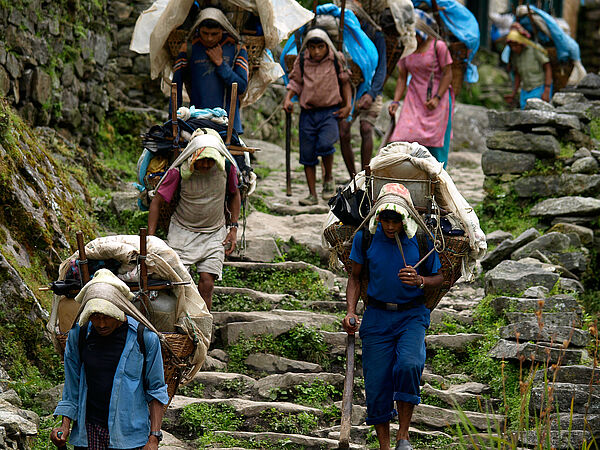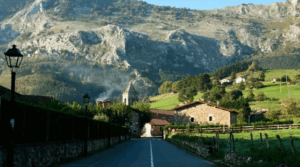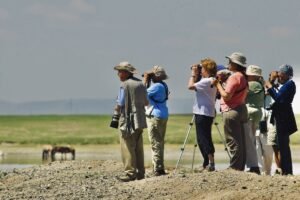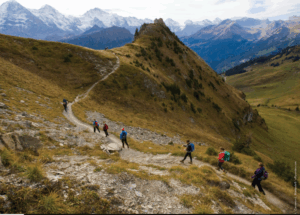Nepal: Tourism sector workers lose livelihoods

By Jonathan Menge and Samira Paudel —
Travel and tourism are central pillars of the Nepalese economy. The government had launched a big promotional campaign to develop the sector further: “Visit Nepal 2020”. In early March, the campaign was cancelled.
Nepal’s tourism sector generated a revenue of 240.7 billion Nepali Rupees in 2018 (about US$ 2 billion), which equals 7.9 percent of the gross domestic product. The sector supports more than one million jobs directly and indirectly and the numbers were expected to grow in 2020. Now, many hotels, resorts, airlines, travel and trekking companies are forced to shut down.
Workers in the tourism sector are left with nothing.
Suman Prasad Parajuli, President of the Union of Trekking, Travel, Rafting, Airlines, Culture, Archaeologies, Courier and Cargo Workers (UNITRAV), is sounding the alarm bell: “There are altogether around one hundred thousand people working in the trekking sector, who are expected to lose their jobs. Around 70.000 trekking porters, 22.000 licensed trekking guides and 4.000 mountain trekking guides as well as many cooks and cleaners are going to be unemployed. So are five thousand tour guides, 3500 local guides, ten thousand in transport, rafting guides and outsourced airline jobs.”
After international travel came to a grinding halt in the last weeks, there are still thousands of tourists in the country. Some governments have started to bring their stranded citizens home. Some of them are still stuck in famous tourist destinations like the lakeside city of Pokhara, located close to the Annapurna range, one of the most popular regions for trekking.
As the last tourists are leaving, their guides and porters stay behind: “Nepal is one of the most famous and safe destinations for mountain and mountaineering activities such as trekking and hiking. There are also many other cultural sights to see, but the European and Asian travelers mostly come for trekking. There are more than one thousand trekking guides and porters who are jobless now in Pokhara due to the lockdown”, says Bijay KC, President of UNITRAV Pokhara.
Most of them have little protection and often very limited savings: “They work on daily wages: you earn, you eat”, says Dipesh Prasad Thapaliya, tour guide and secretary at the organization department of UNITRAV.
Workers need support to sustain their livelihoods
As the country is under lockdown, people are only allowed to go out for grocery shopping. The country’s middle class -mostly living in their family-owned houses – can probably cope with these challenges for a while. Most of them have been stocking up and preparing for a shutdown in the last weeks. Many Nepalis still remember the earthquakes of 2015 and the following hardships all too well. But for daily wage labourers, the times are already harsh. How long can they hold out with little to no savings and without meaningful government support? What are the consequences?
Dipesh Prasad Thapaliya fears the worst: “There are thousands of workers across the country who run their life through daily wages. It is hard for them to survive, especially in the city areas where they are now stranded because of the lockdown. They are not even able to return to their villages. This economic crisis might bring physical as well as mental problems for them, which might be even more dangerous than the coronavirus.”
The overall impact on the Nepalese economy is hard to predict, but some immediate effects of the crisis are already felt. Vegetable prices doubled in the last week, the prices of other essential food items went up by 10-20 percent. Propane gas is hard to come by.
Nepal is heavily reliant on imported goods, most of them coming from India. Nepal’s huge trade deficit has been largely financed with workers’ remittances from abroad, which amount to about 30 percent of the gross domestic product.
The tourism sector might not recover anytime soon. Meanwhile, people’s livelihoods need to be sustained. But for the workers in the Nepali tourism industry, there is no quick fix in sight.
Jonathan Menge is the Director of the FES Office in Nepal and coordinates the work on gender justice in Asia. Samira Paudel is a Project Coordinator at FES Nepal.
Photo: Flickr / Gavin Yeates














